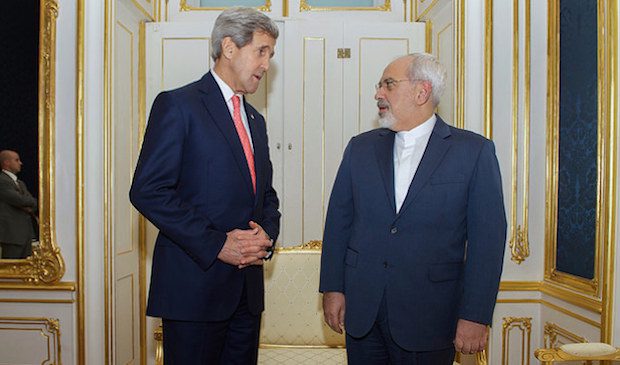Iran: We Need to Talk

Nuclear negotiations with Iran have been extended, but the incoming Republican Senate majority isn’t enthusiastic about them.
“We’re definitely getting played by the Iranians,” says Illinois Sen. Mark Kirk, a leading proponent of sanctions.
“Extending talks with Iran won’t achieve the goal of a nuclear-weapon-free Iran,” concurs Florida Sen. Marco Rubio.
The negotiations have been “much waste of time,” according to another conservative observer, since “the chief negotiator was not to be trusted.”
Actually, this last quote comes from a hard-line Iranian newspaper. Despite the well-worn talking point that diplomacy plays into the hands of the ayatollahs and the mullahs, Iranian hard-liners are as skeptical of talking as John McCain.
“You cannot trust the Great Satan,” the Iranian army deputy chief of staff has been quoted as saying. “The Great Satan promises but does not deliver.”
Diplomacy will be deeply unsatisfying for American policymakers expecting zero uranium enrichment or Iranians who want zero Western sanctions. But support for this course doesn’t require any undue faith in either Tehran’s intentions or the Obama administration’s competence.
After the Iraq War, invading and occupying Iran to shut down any nuclear program is out. Our viable options beyond blithely accepting Iranian assurances it is not building a bomb are limited.
The West can work to prevent an Iranian bomb through aggressive and intrusive international inspections. Or we can hope some combination of bombing and sanctions will either persuade Tehran to abandon any nuclear ambitions or cause the Iranian people to overthrow their government.
Senate hawks argue that bombing Iranian nuclear sites could set the nuclear program back further than the interim deal. But few argue U.S. or Israeli strikes could end it permanently.
Bombing would not only delay Iranian nukes at a greater human cost, it would risk rallying young, reformist segments of the population behind the ayatollahs. It would harden Iranian support for the nuclear program not just as a matter of national pride but as a guarantee of the government’s survival.
Over time, our intelligence about where the nuclear sites are would deteriorate relative to what we would learn through inspections. And the idea that sanctions and bombings will produce a pro-American response from the Iranian populace simply flies in the face of human nature.
A sanctions regime without strong international support may make Senate cosponsors feel good about themselves, but it won’t do much to influence Iranian behavior. Just ask the Cubans, whose communist tyranny has outlived the Soviet Union by a quarter-century, about the embargo.
Is an Iranian nuclear deal guaranteed to work? No. Senate Republicans point to the failure of the 1994 pact with North Korea, negotiated by the Clinton administration with the help of Jimmy Carter (making it a perfect symbol of disaster for conservatives) as an example of what could go wrong.
But this example also illustrates the limits of the more hawkish alternatives. Absent some unacceptable level of aggression by North Korea, who really counsels war as the solution?
The Republican congressional majorities of the 1990s didn’t like the North Korean framework either. But the actual policies they were free to contemplate fell short of their rhetoric about overthrowing a rogue regime.
Many Republicans sense that their options aren’t much better with Iran today. That’s why a joint letter from the incoming Republican senators, whose foreign-policy views are on average more Tom Cotton than Rand Paul, asks for “comprehensive inspections of suspected nuclear development sites” and is silent on military force.
Inspections are not perfect, but their track record is preferable to other options.
After more than a decade of U.S. war in the region, is Iran weaker or stronger? How about militants like the Islamic State or jihadists in post-regime-change Libya? Does international law prevail, or the law of unintended consequences?
To ask these questions is to answer them. Perhaps this time it is better to jaw-jaw than to war-war.
It may be possible to avoid both an Iranian bomb and war with Iran. It’s certainly possible to end up with both a war and a bomb.
W. James Antle III is editor of the Daily Caller News Foundation and author of Devouring Freedom: Can Big Government Ever Be Stopped?
Comments